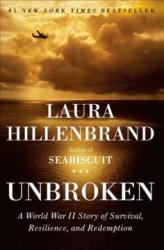
Unbroken (teen version) is a well crafted biography written by Laura Hillenbrand. Unbroken tells the story of Louie Zamperini, an Olympian and bombardier of World War II. Louie was mischievous and trouble-making as a young boy until his older brother, Pete, introduced him to running. As Pete urged Louie into the sport of running, Louie began to desert his old ways and commit himself to running. Louie soon was at the top of his school in running, setting new records and winning numerous races. Louie’s skill carried him all the way to the 1936 Berlin Olympics. Reaching the strongest point of his life, Louie hoped to travel to Tokyo for the following Olympic games. Unfortunately, terror came and his dreams were to be put on hold.
World War II struck, causing Louie to enter into the Army Air Forces as a bombardier. Louie and his team of airmen faced many near death experiences.
Although these were blood-curdling situations, none would compare to what Louie was soon to face. On a rescue mission in May of 1943, Louie’s plane crashed. The crash led to a terrifying and unfathomable journey on which Louie survived life on a raft and the wrath of Japanese guards of the POW camp he resided at. Louie went through incomprehensible pain from being beaten by his captors, having to perform forced labor, going through starvation, and constantly battling a sickness. He was also robbed of his self-esteem and was treated like he was worthless. Consequently, Louie’s story is breathtaking and intriguing. Unbroken provides insight on the torturous lives of POW during WWII and the determination and perseverance of many during WWII.
I highly recommend this book to anyone who is a WWII buff, history lover, or is in search of a thrilling and breathtaking story. I enjoyed it because I am interested in learning about World War II and I found the book to be moving.
Unbroken is fascinating and is not dull or boring. The book will leave you wanting more and you will find it hard to put it down. However, I found the beginning part to be a bit uninteresting and tedious, as it told about the planes and equipment for World War II. Once that part is over, though, the book is quite exhilarating. I would caution that younger children should not read the book, as there are some graphic and gruesome scenes of how the POWs were treated. I would suggest the book for teens between the ages of 13-16, since there is an adult version of the book for those older than these ages.
Unbroken is one of my favorite books, and anyone who is interested in history or is seeking an electrifying story should read it.
Reviewer Grade: 9
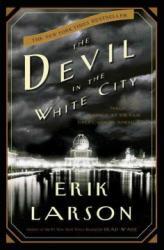
The Chicago World’s fair, also known as The World’s Columbian Exposition, was a world’s fair held in Chicago in 1893 meant to counter France’s world fair and give Chicago back its fame, and even though it was not yet completed when opened, it proved to be a phenomenal success. The Devil in the White City follows the life and story of two interesting men:
Daniel Hudson Burnham and H.H. Holmes. Burnham is the famous architect who directed the construction of the fair and Holmes was a psychotic, but genius and seductive, serial killer who used the World’s fair to lure his victims, almost always women, to their death. Although their lives different, their stories and accomplishments are intertwined and connected, which Larson seeks to condense. With a meager three years to build the fair, and setbacks such as the death of his partner, weather, and health issues, Burnham struggles to finish the fair on time, more or less make it better than France’s.
Meanwhile, Holmes uses his persuading words and charms to commit fraud, acquire debts he never plans to pay back, and worst of all be able to kill and dispose of human bodies with ease. Burnham’s and Holme’s stories never connect in the beginning, and they never meet each other, but as Larson explores the events of 1890-1893, the connection between them becomes clear.
Reviewer Grade: 10
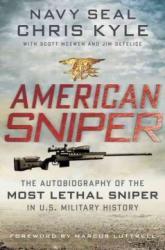
Chris Kyle was nothing more than a simple Texan man who loved hunting and rodeos. All that changed in 1999 when Chris signed up for the Navy SEALs and began BUD/s training. From that moment on, Chris Kyle vowed to protect and fight for his nation, even putting country before family. American Sniper is an autobiography written by Kyle himself, as he talks about his childhood, life before, and after becoming a SEAL. He records life on the battlefield of Fallujah and Ramadi, but also the relations he had with his teammates, both alive and deceased. Kyle is acknowledged to be one of the deadliest snipers’ in American History with a count of 160 confirmed kills. This is one of the most well-written and amazing novels I have ever read and for anyone who didn’t know, Chris Kyle was killed on February 2, 2013 on U.S soil by a former marine, which makes this book all the more honorable and, for lack of a better word, sad. When reading this, you can actually know what the life of a SEAL, or even a militant at that, was like but also that Chris Kyle was an amazing man who gave so much for so little.
Reviewer Grade: 11
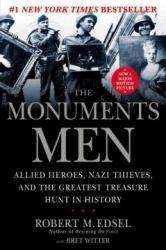
This read provides an interesting and fast-paced approach to learning the history of World War II’s MFAA, while it is also entertaining as a historical story in itself. It reminds us that valor does not only belong to those who fight the physical wars, but also to those who protect the traditions and values upon which we built and sustain our culture. It awakens pride in us as Americans, as well as respect for the universal value of culture in all nations. The Monuments Men ties together the art of war, the value of culture, the unity of a nation, and the interest of history.
Reviewer Grade: 10

I’ve always loved learning about the holocaust and people’s stories. Elie Wiesel's story is the best one I’ve heard yet. He puts so much emotion into his story and his writing and it makes you feel like you’re in the holocaust. Elie starts his story off by talking about his religion and the church he went to. His instructor, Moshe the Beadle had been gone for so long, and when he returned he had a story of a near death experience with the Nazi's. Of course, no one believed his “story” and they carried on with their lives as normal. One night they got real news that the Nazi's were coming the next morning and that’s when everything bad started happening.
All the walking, traveling, and suffering he went through was very interesting to read. My teacher read this book to the whole class in 8th grade and I instantly fell in love with it.
Reviewer Grade: 9
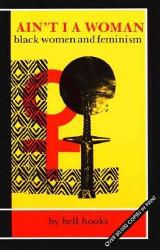
The history behind feminism is deeply engraved into this book. Being a passionate feminist myself, I loved reading this book because it gives me a different look on society and how society treats black women. Bell Hook's purpose was to educate her readers and show how black women were treated with disgust during the times of slavery and further more. The writing is bold, strong, powerful, unapologetic, and true. This book is not just for black women, but for everyone to read and be taught how life really was back then. You will learn so much from this book and hopefully have more respect for those around you. She really stresses on how dehumanizing, sexist, and poisoning people were to black women. An 11/10 read.
Reviewer Grade: 12
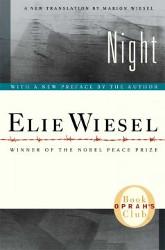
Elie Wiesel is a twelve year old Jewish boy living in Sighet, Romania in 1944 who loves to study the Talmud. When his instructor warns the people of the Nazi aggressors coming to threaten their peaceful lives, it is too late and Elie’s family is forced into ghettos. Elie and his father, Shlomo, are separated from the rest of their family and are sent to multiple concentration camps, just trying to survive. This is my second favorite book ever because it is written by Elie Wiesel himself and is about his life as a Holocaust survivor. I can’t even describe
how good this book is because once you realize it is nonfiction, it gives the book a whole new meaning. I highly recommend this book to everyone, but especially those interested in the Holocaust or books about it such as The Diary of Anne Frank. I picked this book because I love autobiographies about the Holocaust and it just really shocked me at how life for Jews during that time was.
Reviewer Grade: 10
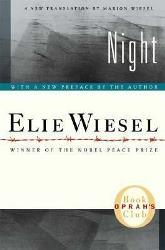
The Boy in the Striped Pajamas was a heartbreaking story, but it was a work of fiction. This story is just as sad, but is written by a holocaust survivor himself. This story will make you cry so beware. It made me cry, but was a complete eye opener to the history of WWII. This book is a classic and will satisfy all audiences with its moving story.
Reviewer Grade: 9